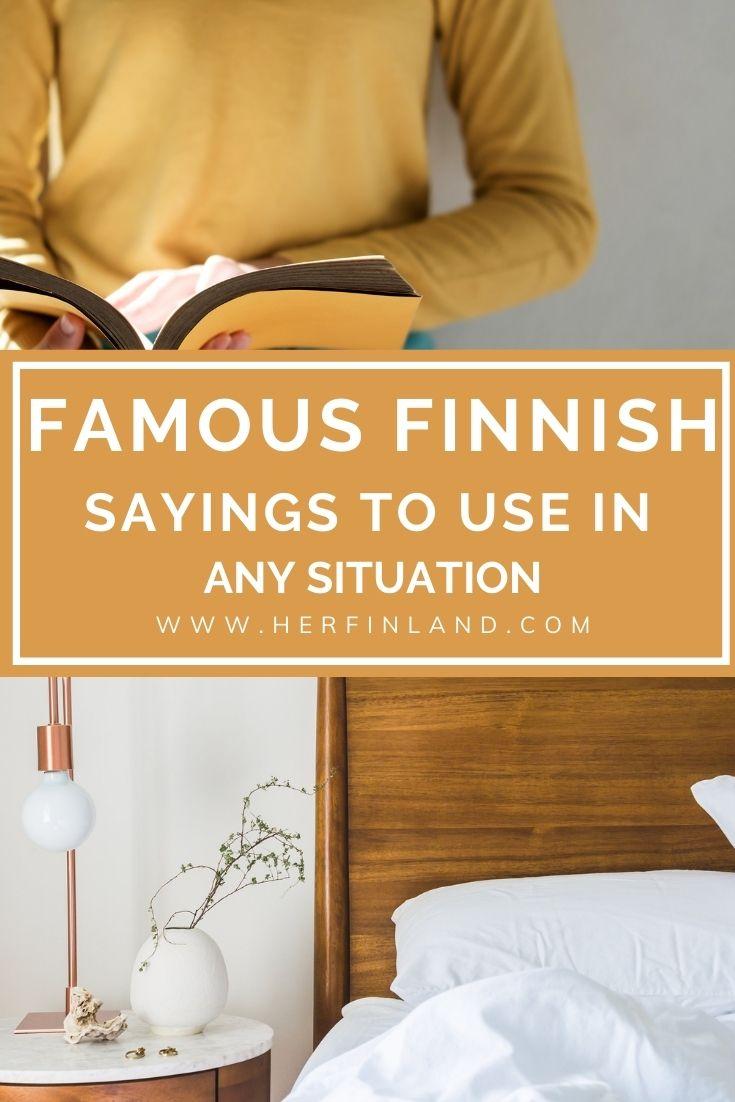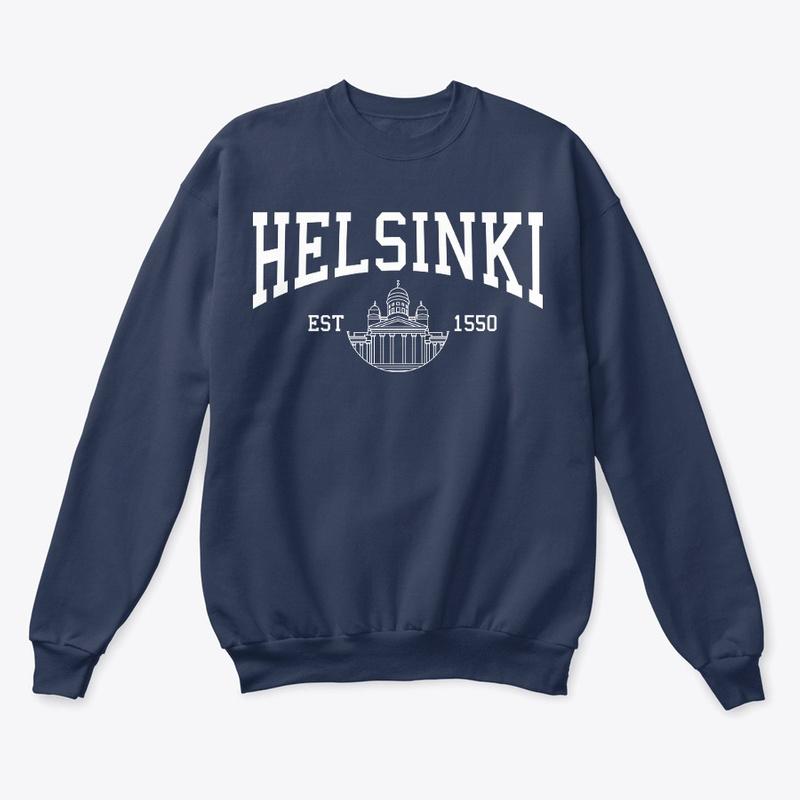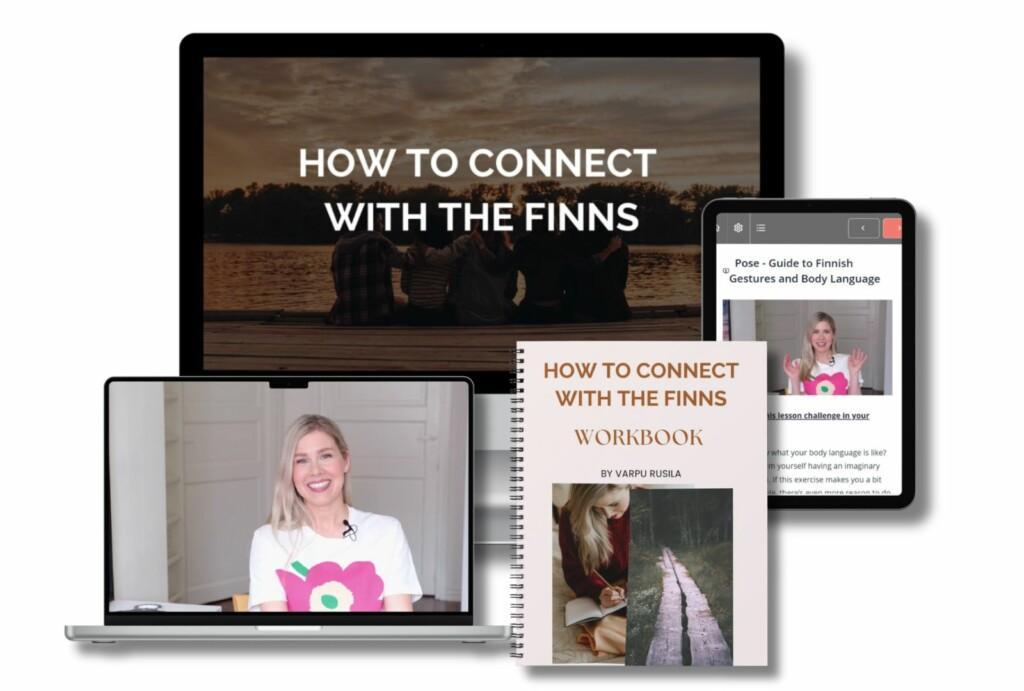The Finnish language is full of sayings and wisdom. I feel that Finnish proverbs are the backbone of the Finnish culture because they
- offer a way of saying your thoughts without being too pushy. Finns hate to be pushy!
- help you understand others
- help you do the right thing in surprising or unpleasant situations
Sayings and idioms are passed from one generation to the next by oral tradition and I hope this tradition will continue also in the future.
There seem to be hundreds of these nuggets of Finnish wisdom because almost every time I have a deeper conversation with an older Finn, I notice a proverb that I haven’t heard before.
As I’m only a humble admirer of the ancient Finnish words and sentence structures, I have used some artistic liberty in the translations of these Finnish sayings into English.
My goal has been to honor the saying with my translation, not to hurt it. I’m more than happy to welcome any improvements or ideas to make the translations better. After all, language is always a collective effort.
Famous Finnish sayings
#1 The morning is wiser than the evening.
In Finnish: Aamu on iltaa viisaampi.
If you’re unsure, feeling stressed or discouraged, sleep on it. The following morning shows things from the right perspective.
This saying can be also written in the opposite way. Ilta on aamua viisaampi. = The evening is wiser than the morning.
This can be interpreted to mean that you get wiser through age or experience. It can also mean that delaying something can be a good decision, especially if you are acting sentimentally.

#2 Who asks for the road doesn’t get lost.
In Finnish: Ei kysyvä tieltä eksy.
If you’re unsure, you should ask for advice. In general, we Finns don’t ask much advice because we want to be self-sufficient and also, because we don’t want to disturb others.
This saying reminds Finns that it’s okay to ask. In this sense, there are similarities to the old chestnut in English: “There’s no harm in asking.”
#3 Work teaches the worker.
In Finnish: Työ tekijäänsä neuvoo.
When you start something new (a job, hobby, etc.), it’s okay to not know about anything, be slow and to make mistakes. That’s how you’ll learn. You will get better.
#4 The brave eats the soup.
In Finnish: Rohkea rokan syö.
This Finnish saying means the same as “Fortune favors the brave”.
#5 Emergency finds the way.
In Finnish: Hätä keinon keksii.
This Finnish saying means the same as “Necessity is the mother of invention”. Things always get solved, when it’s the last minute or a critical situation.
#6 The forest answers in the same way one shouts at it.
In Finnish: Niin metsä vastaa, kuin sinne huudetaan.
The forest is the second home for Finns and plays an essential role in the Finnish mythology.
This Finnish saying means the same as “What goes around, comes around” or “You reap what you sow”.
In German, there’s a proverb almost word to word with the Finnish expression: ”Wie man in den Wald hineinruft, so schallt es heraus”. The Finnish and German proverb refer to the forest echo.
FinNISH CONNECTION COLLECTION 🇫🇮

Finland-themed sweaters and accessories made-to-order. 🧡 Worldwide shipping.
#7 What comes singing, leaves whistling.
In Finnish: Mikä laulaen tulee, se viheltäen menee.
This Finnish saying means the same as “Easy come, easy go”. The things that come easy, are easily gone.
#8 A poke in the eye for the one, who dwells on the past.
In Finnish: Joka vanhoja muistelee, sitä tikulla silmään.
There is no use to dwell on the past and hold a grudge. A similar English expression could be “That’s water under the bridge”.
#9 The pot blames the kettle, yet both have a black side.
In Finnish: Pata kattilaa soimaa, musta kylki kummallakin.
This Finnish saying means the same as “The pot calling the kettle black”. The proverb describes a situation in which both parties are equally responsible but one is trying their best to be innocent.
#10 There are many means, said granny when she was wiping the table with the cat.
In Finnish: Konstit on monet, sano mummo kun kissalla pöytää pyyhki.
This Finnish saying means the same as “There are more than one ways to skin a cat.”
#11 A tree is climbed from its base.
In Finnish: Tyvestä puuhun noustaan.
This Finnish saying means the same as “Learn to walk before you can run.” The proverb highlights the importance of learning the basics before diving into more advanced things.

#12 You don’t choose a dog by its hair.
In Finnish: Ei ole koiraa karvoihin katsominen.
This Finnish saying means the same as “Don’t judge a book by its cover.”
#13 Emergency does not read the law.
In Finnish: Hätä ei lue lakia.
This Finnish saying means the same as “Desperate times call for desperate actions” or “Necessity knows no law.”
#14 Who has happiness should hide it.
In Finnish: Kell’ onni on se onnen kätkeköön
Finnish happiness has been in the news recently as Finland has topped the UN’s World Happiness Report repeatedly. Even we Finns were a little surprised by this, and this Finnish saying may well explain why.
The saying could act as a warning about creating inequality: if you have something others don’t, there’s no need to boast, and not much good can come out of making it known. The words could also mean “who has luck should hide it”.
#15 The one who is afraid won’t play.
In Finnish: Ei se pelaa, joka pelkää
This saying refers to having the courage to take action and is used by people when they take a risk. It means roughly the same as “No guts, no glory.”
#16 In need, you know a friend.
In Finnish: Hädässä ystävä tunnetaan
The saying means you recognize real friends during difficult times as you can rely on them. Similar to “A friend in need is a friend indeed”.
#17 A name doesn’t make a man worse if the man doesn’t make the name worse.
In Finnish: Ei nimi miestä pahenna, jos ei mies nimeä.
Don’t judge anyone by their name unless they themselves make the name infamous through their actions.
#18 The day is in the tally stick.
In Finnish: Päivä on pulkassa
This saying is an interesting one. In modern Finnish, the word pulkka is more often used for children’s plastic sled as a winter toy.
Originally, pulkka in this saying refers to a wooden tally stick that farm owners and their workers used to keep track of work. At the end of the day, both parties would place the two sticks next to each other and mark the same spot on each tally stick. That meant the workers had finished work for the day.
Nowadays, it would be easy to interpret the saying as “the day’s work is in the sled”, which probably partly explains the expression’s popularity even though tally sticks are long gone.
#19 You can spend your money and get there on a horse.
In Finnish: Rahalla saa ja hevosella pääsee
You need the right means to get what you want. Similar to “can’t get something for nothing”, this saying is used in a situation where you are willing to spend for what you need.
#20 All the years are full of learning.
In Finnish: Oppia ikä kaikki
The Finnish version of “live and learn”, this saying suggests you keep learning new things all your life through experience.

#21 Forward, said granny in the snow.
In Finnish: Eteenpäin sanoi mummo lumessa
This unusual saying has a very Finnish message for us: keep going through difficulties with determination.
The Finnish YLE radio even writes about a snow running event organized by a local radio station that tested how fast volunteers can advance in the snow – they found that Finnish grannies are in good shape. The competition winner was Eeva, who completed the 40-meter course in just 15 seconds. Afterward, the ladies headed to the gym.
#22 A container chooses its lid.
In Finnish: Vakka kantensa valitsee
You choose to surround yourself with certain types of people who have the same tastes, interests, or values. Also used about couples: everyone finds the right kind of partner.
Historically vakka is a wooden container that could often have only one specific lid that fits.
Similar to “birds of a feather flock together”.
#23 You can’t grab something from nothing.
In Finnish: Tyhjästä on paha nyhjästä
This Finnish saying is often used when you don’t have any money. It means it’s difficult to start with nothing, and you can’t simply keep taking if nothing is left.
#24 No one is born a smith.
In Finnish: Ei kukaan ole seppä syntyessään
This Finnish saying means you can only master something through learning and experience. It’s okay to make mistakes as you learn.
#25 An accident doesn’t come with a bell around its neck.
In Finnish: Vahinko ei tule kello kaulassa
This Finnish saying reminds you that you won’t get a warning beforehand when bad things happen. It’s good to be prepared that sometimes things may happen out of the blue.
How to connect with the finns

Understand Finns even better and build relationships with confidence. ⭐⭐⭐⭐⭐
#26 Caution does not tip over the boat.
In Finnish: Ei vara venettä kaada
Being cautious and prepared doesn’t cause any harm. This saying means the same as “better safe than sorry”.
#27 Don’t lick it before it drops.
In Finnish: Älä nuolaise ennenkuin tipahtaa
Don’t get ahead of yourself. The same as “don’t count your chickens before they hatch”.
#28 Everyone is the smith of their own fortune.
In Finnish: Jokainen on oman onnensa seppä
This Finnish saying reflects the idea that you can work towards your own happiness and make choices that lead you there. But the opposite is also true if you make poor choices.
Similar to “every man is the architect of his own fortune”.

#29 It doesn’t help to cry at the market fair.
In Finnish: Ei auta itku markkinoilla.
This Finnish saying means the same as “It’s no use crying over spilled milk.”
#30 A strong will takes you through the grey stone.
In Finnish: Luja tahto vie läpi harmaan kiven.
This Finnish saying means the same as “Where there’s a will there’s a way.”
#31 Two flies with one hit.
In Finnish: Kaksi kärpästä yhdellä iskulla.
In English, there’s a popular saying “to kill two birds with one stone”. It means to accomplish two things at once. In Finnish, we hit flies instead of birds!
That was the entire list. Huge congrats for making it all the way to the end!
If you want to learn more Finnish phrases and expressions, be sure to check out thse 50+ Funny Finnish Phrases that Describe the Finnish Mindset. I have also listed 50+ Finnish quotes or Finland-related quotes here.
Do you know some other Finnish proverbs? Or do you want to know more about a certain Finnish saying? Let me know and comment below!
Looking for more information about the Finnish language and culture? Check out some of my other posts:
- Best Finnish Language Learning Resources for Beginners
- Best Finnish Vocabulary Hacks: 100-word list
- 20 Sweet Ways to Say I Love You in Finnish
- How to Say Thank You, You’re Welcome and Please in Finnish
Want to know my 7 favorite Finnish sayings? Check out my YouTube video to get a more in-depth look at when to use these sayings!



James Ferry
Wednesday 20th of November 2024
Hello. My Finnish grandmother had some expressions. I don't speak any Finn, so these are really bad, but.... "Se on sen pairan muhre" (or something like that) which meant "That's that day's murder." In other words, don't worry about it. Something that sounded like"Kure Koiree Koiree tunta" which literally meant "one dog knows/sniffs another" but meant one Finn knows another (presumably when meeting outside Finland). If you can help me get these right, I would appreciate it. Have you ever heard either one?
Peg Widdes
Wednesday 10th of July 2024
Looking for the phrase, "Take me back to the trees," in Finnish. I would like to paint it on a piece of driftwood as a birthday gift for my nature loving son.
Varpu
Thursday 26th of September 2024
This is beautiful!!
akhila
Monday 12th of February 2024
Those are great additions to this list, thank you so, so much!
Varpu
Monday 18th of March 2024
Happy that you loved these sayings!
Taneli
Friday 10th of November 2023
Vaikeneminen on kultaa, puhuminen hopeaa = Silence is gold, speaking is silver.
Eeva
Wednesday 19th of July 2023
There are two funny sayings that refer to trying to do something in an impossible or wrong way: 1. Ajaa käärmettä pyssyyn (to drive a snake inside a gun) and 2. Nousta perse edellä puuhun (to climb a tree with your ass up).
Varpu
Friday 28th of July 2023
Those are great additions to this list, thank you so, so much!